The FINANCIAL — Amazon.com, Inc., announced a lawsuit against 13 individuals and businesses (collectively, the “defendants”) for advertising, promoting, and facilitating the sale of counterfeit luxury goods in Amazon’s store, in violation of Amazon’s policies and the law.
The lawsuit was filed in the United States District Court for the Western District of Washington and alleges the defendants operated in concert with each other to sell counterfeit products and engage in false advertising.
Among the 13 defendants, the lawsuit alleges that Kelly Fitzpatrick and Sabrina Kelly-Krejci conspired with sellers to evade Amazon’s anti-counterfeiting protections by promoting counterfeit products on Instagram and TikTok as well as their own websites. Fitzpatrick and Kelly-Krejci posted side-by-side photos of a generic, non-branded product and a luxury counterfeit product with the text, “Order this/Get this.” “Order this” referred to the generic product falsely advertised on Amazon, and “Get this” referred to the counterfeit luxury product. By posting only generic products on Amazon, Fitzpatrick and Kelly-Krejci – and the sellers they coordinated with – attempted to evade our anti-counterfeit protections while using social media to promote the true nature of these counterfeit products. Fitzpatrick and Kelly-Krejci also posted numerous videos describing the alleged high quality of the counterfeits they promoted.
”These defendants were brazen about promoting counterfeits on social media and undermined the work of legitimate influencers,” said Cristina Posa, Associate General Counsel and Director, Amazon Counterfeit Crimes Unit. “This case demonstrates the need for cross-industry collaboration in order to drive counterfeiters out of business. Amazon continues to invest tremendous resources to stop bad actors before they enter our store and social media sites must similarly vet, monitor, and take action on bad actors that are using their services to facilitate illegal behavior.”
Fitzpatrick was previously a member of the Amazon Influencer Program, but after Amazon detected her counterfeiting activities, she was removed from the program. She continued to advertise counterfeits using social media sites and directed followers to her own website. Amazon also detected and blocked Kelly-Krejci’s scheme and she similarly began to direct her followers to purchase counterfeits on her own website. The defendants also began directing their followers to other e-commerce websites:
“[N]ow as most of you know amazon [sic] has really cracked down on dupes … now they’re [sic] are barely any [dupes on Amazon],” said Fitzpatrick. “Our very trusted seller of the last year has moved to DH Gate … I know it’s a big change to switch from Amazon to DH Gate but this guarantees that the links do not get reported and shut down sometimes cancelling our orders.”
Amazon strictly prohibits counterfeit products in its stores, and in 2019 alone, invested more than $500 million to protect customers and brands from fraud, abuse, and counterfeit. Amazon’s proactive investments in preventing counterfeit include robust seller vetting, advanced machine-learning based technologies, and industry-leading brand protection tools like Project Zero, Brand Registry, and Transparency. As a result of Amazon’s efforts, 99.9% of all products viewed by customers on Amazon have not received a valid counterfeit complaint. In June 2020, Amazon launched its Counterfeit Crimes Unit, a global team with specialized experience in investigating and bringing legal action against bad actors.
Amazon has filed a series of lawsuits against counterfeiters, including a joint lawsuit with Italian luxury fashion house Valentino, cosmetics retailer KF Beauty, and seller of travel products for parents JL Childress.






























Discussion about this post